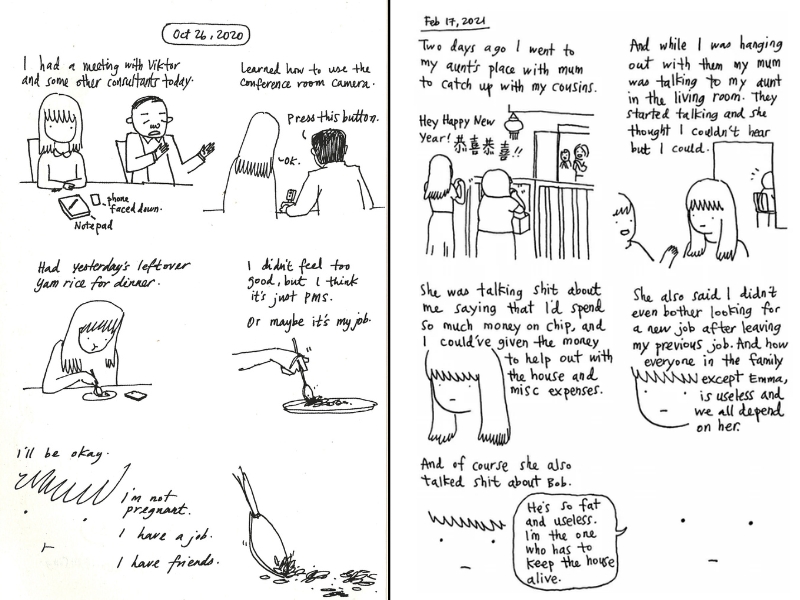
Cheryl's story is told through simple, straightforward sketches that look like they have been documented in someone's personal journal (All photos: Cheeming Boey)
Whenever Cheeming Boey checked up on his friend Cheryl about her new job, he would always ask, “How was your day?” The replies would, more often than not, be rife with unpleasant incidents.
The Singapore-born but Johor Bahru-raised artist would then sketch out Cheryl’s experiences as a sort of cartoon diary, all with the intention of gifting them to her once she had settled down at work. As days turned into weeks and their conversations evolved, Boey realised Cheryl was trapped in a toxic environment and things would never get better. By this time, however, he had amassed enough doodles for a full-fledged graphic novel.
In How was your day, Boey uses this simple question to delve into the complex issues faced by many young adults today. Charting the main character’s daily life across one and a half years, he shines a light on the damage long-term exposure to a harmful work environment can do.
Cheryl, the protagonist just starting out as a project architect at a small practice, is charmingly relatable. On her first day, while she does not particularly have any expectations, the atmosphere already does not feel welcoming. Her boss greets her with just a wave and she is given a sheet of paper containing a set of strict rules. Everyone minds their own business, eats their own lunch and leaves the place by 6pm.
A few days in, she has her first proper meeting with Viktor, a problematic micro-manager who does not seem to understand personal boundaries — Cheryl is asked to accept his ‘friend request’ on Facebook and list the company on her private account. After some time, she also learns of a latecomers list whereby the person keeping track of attendance would broadcast the names of those who arrive after 8:30am in a group chat.
The turning point occurs when Cheryl takes on her maiden project and has to work directly under Viktor. There are times when he would lash out at her for not doing things the way her senior would. When a thoughtful and kind colleague offers to assist, Viktor retorts, “Don’t help her! Let her figure it out!” Cheryl is, once again, reminded of the unspoken rule in the office: “The culture here is to never stand up for yourself. Just keep quiet. My colleague defended himself twice. Got two warning letters. Three and you’re fired.”
hwyd_inner_pages.jpg

Besides workplace challenges, Boey also touches on the subject of family expectations. Cheryl’s parents add to her misery by refusing to acknowledge her struggles while always insisting on having the final say in everything she does.
When Cheryl tells them she is quitting, they argue that such workplace situations are normal and that she should endure the hardship. “It hurt. I just locked myself in the room and questioned my own decisions. And why, as a 28-year-old, I still cared so much about what my family says. When I clearly know what I want more than they do,” she laments.
After moving on from that sorry episode, Cheryl occupies herself with part-time translation work that pays RM46 per chapter. This, thankfully, helps her process her state of confusion and manage her finances as she navigates the next steps.
Boey presents the story in simple, straightforward sketches while using the characters’ facial expressions and body language to get the point across. The handwriting feels real and raw, as if the events are documented in a personal journal — spelling errors are crossed out, words are not written in a straight line and the font size changes.
The artist has always been recognised for his autobiographical graphic novel series, When I Was a Kid (from 2011 to 2022), in which he records his experiences, typical childhood tales of surviving school, siblings and parents, all told with honesty and humour. How was your day is an altogether different collection of stories targeted at a more mature demographic.
Nonetheless, this book does challenge its readers— particularly those just starting their careers — to rethink just how much they are willing to put up with in order to attain their goals. The most important lesson however, captured in Boey’s sensitive squiggles and razor-sharp observations, is this: If you can no longer produce a positive response when asked about your day, it is a clear sign that you have sacrificed too much to live up to another person’s definition of success.
This article first appeared on May 12, 2025 in The Edge Malaysia.


